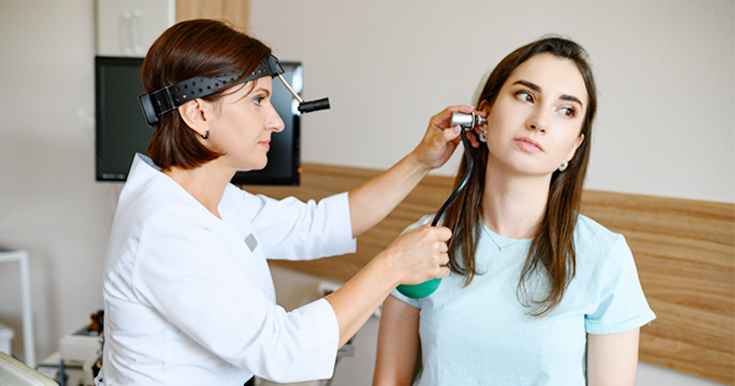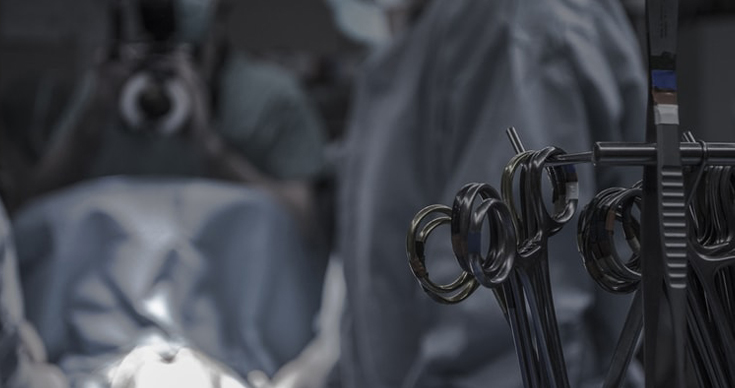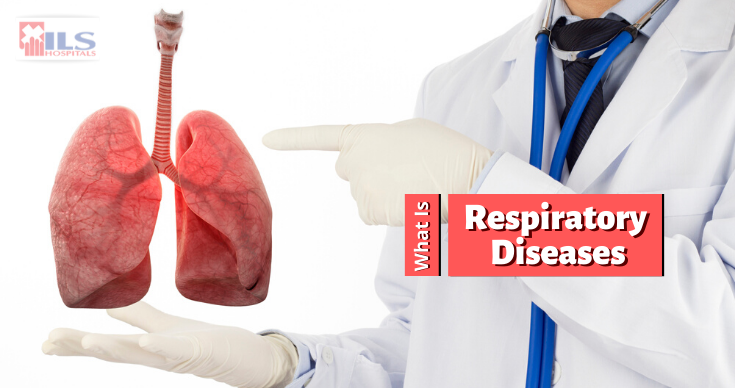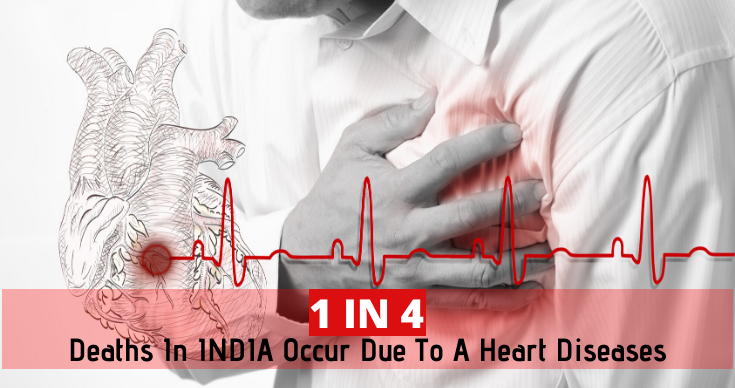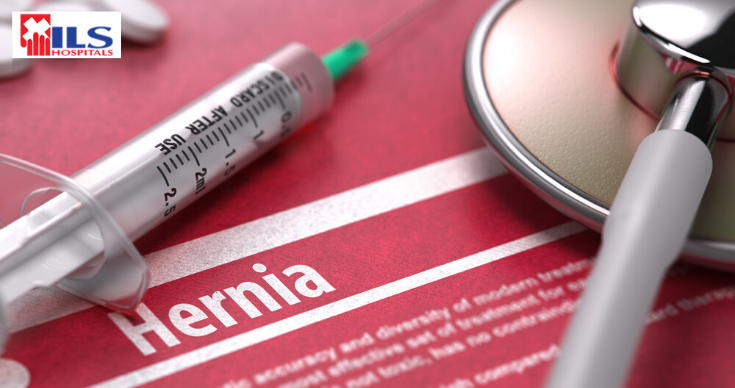Visiting an ENT Specialist During COVID-19
The COVID-19 pandemic not only disrupted our daily activities but also questioned our visit to the hospitals
and clinic. An apparent fear encapsulated our minds and rendered us helpless at times.
Apart from the COVID warriors, the medical professionals in the stream of ENT, gynaecology, ophthalmology,
orthopedy, etc., had to face the doubts of taking up patients. For patients, consulting even for ear pain or
nose bleed became an arduous task because of COVID fear.
But the Ministry of Health in India, took specific steps to ensure the smooth functioning of the medical
activities.
In this article, we will see how the ENT specialists in Kolkata, in compliance with the government rule, devised a protective environment for patients to get consulted during COVID-19 times.
Protocols Designed for Visiting An ENT Specialist
ENT is a high-risk area, prone to the spread of COVID-19 infection among the patients and the doctors. The
following protocols or SOPs have been set up by the government for the ENT specialists and the patients to
get better treatment and avoid the COVID-19 virus.
Appointment
- Telecommunication or online consultation should always be preferred between the doctor and the patient
to avoid physical interaction. Even after the surgery, patients should be advised to take a follow-up through
online consultation. - Only one patient should be allowed in the examination room.
- Patients with appointments should be preferred over walk-in patients.
Entry
- Ensure the patient and the ENT specialist is wearing masks, hand gloves, and maintaining social distancing.
- Use sanitisers before entering.
Screening
- Patients are screened using thermal, thermal guns to reduce the exposure to the medical staff.
- Patients with symptoms of COVID-19 are screened in a separate COVID-19 Screening Clinic to ensure the
safety of other ENT patients. - Personnels screening the patients have to wear a PPE kit.
- All the patients and their caretakers must wear a tripled layer mask and a gown.
Precautions Within ENT OPD Room
- ENT OPD room must be well-ventilated.
- The ENT specialists must wear a Level I PPE kit that includes an N95 mask, gloves, gown, and face shield.
- For unavoidable Nasal Endoscopy, doctors and nurses must wear Level II PPE kit that includes an N95 mask,
gloves, cover-all gown, and goggles. Generally, this is to avoid any risk from the aerosol generation during
endoscopies. - Patients with COVID-19 symptoms should be treated in separate wards. Only after the COVID-19 negative
report, they should be shifted to the ENT ward. - Only one care-taker of the patient should be allowed in the ward. The care-taker should also be screened
before entering. - Operation and ENT instruments must be sterilised as per the standard protocol.
- Ward should be cleaned and disinfected regularly.
- A distance of two meters between the patients’ bed is compulsory.
- Belongings of the patients must be kept to a minimum.
- All the furniture in the ward must be kept to a minimum and cleaned regularly.
- Visitors should not be allowed.
- A separate ward should be marked for the tracheostomised patients or the patients with a high potential
of aerosol generation.
Conclusion
The above points are the significant protocols required for ENT consultation. ENT symptoms involve ear pain, nose bleed, sore throat, snoring, hearing loss, etc. The respiratory organs are more prone to the COVID-19 virus. Thus, ENT becomes a crucial branch to follow the safety protocols during such a pandemic.
For more information about ENT specialists in Kolkata, safety procedures, and treatment, visit,
https://www.ilshospitals.com/.
The Know how of Bariatric Surgery
Obesity is a major health risk. It can lead to many cardiovascular diseases, high blood sugar or diabetes, high blood pressure, trouble in your bones and joints due to excessive weight, sleep apnea, gallstones and even a contributing factor to some cancers. Bariatric Surgery includes a series of surgical procedures that involve making changes to the digestive system to help people lose weight. Bariatric surgery provides a safe and comparatively, long-term solution for weight loss.
Types of Bariatric Surgery
There are a few types of procedures for weight loss surgery. They are:
- Lap Band: A surgical procedure to lose weight, here, a silicone band is wrapped around a part of the stomach to create a smaller food pouch. The food eaten is then stored in this smaller pouch. The band can be adjusted to make the pouch bigger or smaller as per the requirements. This band can be removed after achieving the desired weight loss.
- Gastric Sleeve: Here, the stomach is reduced by 60-70% vertically. It is also known as the vertical sleeve gastronomy. The thinner stomach which is like a tube is stapled to be connected to the esophagus and small intestine.
- Gastric Bypass: Gastric Bypass is a slightly more complicated method, also known as the Roux-en-Y method. It involves creating a smaller pouch out of the stomach by stapling it and using the rest of the stomach to digest enzymes. Along with it, the small intestine is cut to a certain length and then connected to the smaller stomach so that lesser nutrients are absorbed.
Advantages of Bariatric Surgery
When it comes to weight loss, laparoscopic bariatric surgery is a highly effective way to lose weight for the morbidly obese. Other than losing weight, it also has many other benefits like improved cardiovascular health, better body image which leads to a healthier mood, reduces or eliminates obstructive sleep apnea, provides relief to the joints and improves fertility among women. It also alleviates as well as prevents other medical conditions like complications in pregnancy, gallbladder diseases, etc.


For people with a BMI above 35 and serious health issues, bariatric surgery is ideal for permanent weight loss and to improve your health. ILS Hospitals, a multi-specialty hospital that is renowned for safe Bariatric Cares urgery under the guidance of Dr. Om Tantia, with 32 years of experience. He is also accredited as “Surgeon Of Excellence” by SRC. The Bariatric Care division is ideal place to get a safe surgery done without worrying about your health and side effects. The Pioneers in Laparoscopic Surgery, ILS Hospitals have 4 branches in the city out of which the Salt Lake branch has the Bariatric Care division. For any queries, consultations or to know more, visit www.ilshospitals.com.
যাতনা কাহারে বলে !
হেপাটাইটিস বি এক রক্তবাহিত জীবাণু এবং সারা বিশ্বব্যাপী লিভার রোগের অন্যতম প্রধান কারণ| পৃথিবী জুড়ে প্রায় 30 কোটি মানুষ আক্রান্ত এবং এ সংখ্যা ক্রমবর্ধমান| ভারতবর্ষে গড়ে শতকরা 4 জন এই ভাইরাস বহন করে চলেছেন; অনেকে নিজের অজান্তেই | অতিরিক্ত সংক্রমণ প্রবণতা দেখা যায় তাদের যারা ইনজেকশন ড্রাগ এড্ডিক্ট, যাদের বহু যৌনসঙ্গী আছে আর যারা চিকিৎসা পরিষেবার সাথে যুক্ত|
2016 সালে বিশ্ব স্বাস্থ্য সংস্থা অঙ্গীকার করে সারা বিশ্ব থেকে 2030 সালের মধ্যে হেপাটাইটিস বি কে নির্মূল করার| আজ বিশ্বের অধিকাংশ দেশেই জাতীয় হেপাটাইটিস বি দূরীকরণ প্রোগ্রাম চালু আছে| আক্রান্ত জনগোষ্ঠীর যেহুতু মাত্র শতকরা দশ ভাগ তাদের সংক্রমণ সম্বন্ধে অবহিত, তাই আরো অধিক সংখ্যায় টেস্ট করার ওপর সর্বাধিক গুরুত্ব দেওয়া হচ্ছে| এছাড়াও হেপাটাইটিস বি দূরীকরণ এর জন্য সর্ব স্তরের মানুষের ভ্যাকসিনেশন, চিকিৎসা পরিকাঠামোর উন্নয়ন, চিকিৎসার সর্বজনীক অধিকার এবং সরলীকৃত নির্দেশাবলী জরুরি পদক্ষেপ|
হেপাটাইটিস বি দূরীকরণের উদ্দেশ্যে কাজ করে চলেছেন অগণিত স্বাস্থ্যকর্মী, গবেষক ও জনস্বাস্থ্য বিশেষজ্ঞ| কিন্তু দুঃখের বিষয়, যাদের কথা ভেবে এতো কিছু সেই আক্রান্ত মানুষগুলো পড়ে আছেন বহু দূরে| তাদের আশা, আকাঙ্খা আর অধিকারের নিঃশব্দ বাণী পৌঁছচ্ছে না কারো কানে| এই অসহায়তা আর বঞ্চনার গুরুত্ব শুধু রুগীর সংখ্যা আর মৃতের হিসাব দিয়ে মাপা যাবে না| প্রতিটি মানুষের অভিজ্ঞতা ভিন্ন ও তাঁর নিজস্ব| আজ তাই সময় এসেছে এই আক্রান্ত মানুষগুলোর কথা শোনার|
সমাজবিদেরা আজ প্রধানত তিন ধরণের সমস্যার কথা উপলদ্ধি করছেন :
1. প্রাথমিক সমস্যা : যা আক্রান্ত ব্যক্তির মনোসামাজিক সমস্যা
2. আনুষঙ্গিক সমস্যা : যা আক্রান্ত ব্যক্তির প্রতি সামাজিক প্রতিক্রিয়ার ফলস্বরূপ
3. সুদূরপ্রসারী সমস্যা : এই সামাজিক প্রতিক্রয়া যে ক্ষতি বয়ে আনে
প্রাথমিক সমস্যার মধ্যে প্রথমেই পরে লিভার ক্যান্সার ও লিভার সিরোসিস এর ভয়| হেপাটাইটিস বি রোগ নির্ণয় এক অজানা আশংকায় ভাবিয়ে তোলে; আছে রোগের ক্রমবর্ধমানতা আর অকাল মৃত্যুর ভয়| গুগল ইউনিভার্সিটি তে রুগী হাতড়ে চলেন হেপাটাইটিস বি র তথ্যভান্ডার| আর যত বিদ্যে বাড়ে ততই বাড়ে ভয় ও আতঙ্ক| তথ্য আছে কিন্তু নেই এমন কোনো সার্চ ইঞ্জিন যা দেবে ভরসা| তাই আসে একাকিত্ব, হতাশা আর বাস্তব কে অস্বীকার করবার জেদ| দুশ্চিন্তা ও হতাশা আরো ডালপালা মেলে যখন একদিন সত্যিই রোগের লক্ষন দেখা দেয়|
এর সাথে যোগ হয় আর্থিক চিন্তা| নিয়মিত চিকিৎসা, ঘন ঘন কাজ কামাই, ব্যয়বহুল পরীক্ষা নিরীক্ষা; এসবের দাবি যে অন্তহীন| তার উপর পরিবারের বাকি সদস্যদের পরীক্ষা, তাদের ভ্যাকসিন দেওয়ার ব্যবস্থ্যা – সব তো আর ইন্সুরেন্স দেবে না| আর ভাইরাস ছড়ানোর ভয়| নিজের ই টানা লক্ষ্মণরেখায় গুমরে মরে| বিয়ে নয় সন্তান নয় | শুধুই তুমুল একাকিত্ব |
আনুষঙ্গিক সমস্যা গুলির দিকে এবার দৃষ্টিপাত করা যাক| এতো ঢাক পেটানো প্রচারের আলো তাও মানুষ এখনো ভেবে চলেছেন একসাথে খাবার খেলে, এক চেয়ার এ বসলে, হাত মেলালে, এক গাড়িতে চাপলে সংক্রমণ ছড়াবে| কেউ কেউ আবার ভাবছেন এ ব্যাটা বংশগত রোগে ভুগছে| মানুষের জ্ঞানের পরিধি বাড়লে তো এসব অবৈজ্ঞানিক চিন্তা থাকার কথা নয়| দুঃখের ব্যাপার হলো এ ব্যাপারে চীন এর হাইমেন শহরে এক সমীক্ষায় দেখা গেলো সম্পূর্ণ উল্টো ফল – যত জ্ঞান বাড়ছে তত বাড়ছে ছুৎমার্গতা| তাই শুধু তথ্য নয়, ভরসাটাও জরুরি| এ ব্যাপারে এগিয়ে আসতে পারতেন চিকিৎসক ও স্বাস্থ্যকর্মীরা| কিন্তু তারা নিজেরাই ভাইরাস এ আতংকিত হওয়ায় তাদের সদিচ্ছা রূপ পাচ্ছে না| সংক্রামিতর পরিবারের সকল সদস্যকেই ক্যারিয়ার ভেবে নিলে ভুল হচ্ছে|
কর্মস্থলে দিনরাত চলছে চাপা গুঞ্জন| আইন আছে অনেক কিন্তু তা ঠুঁটো জগন্নাথ| কোনো কোনো দেশ তো দেয় না প্রবেশের অধিকার |
আর তাই দিনের শেষে আসে নীরবতা, আসে একাকিত্ব | বৃহত্তর সমাজথেকে দূরে সরে যাওয়া | মাদুলি তাবিজ, তুক তাক আর জড়িবুটির অন্ধগলির খোঁজ চলতে থাকে | ধেয়ে আসে অপরাধবোধ|পাপের ভোগ না কর্মফল| নিস্তেজ মন ভাবে এ জীবন মূল্যহীন|
আজ 28শে জুলাই ওয়ার্ল্ড হেপাটাইটিস ডে তে আমরা যখন আলোকিত আলোচনাসভায় বসেছি, তখন আমাদের চেতনায় থাকুক এই মানুষ গুলোর না বলা কথা আর অজানা উপলদ্ধি| ওষুধ, পরীক্ষা আর ভ্যাকসিন এর সাথে প্রেসক্রিপশন এ জায়গা করে নিক ভালোবাসা, মমত্ব আর সহানুভূতি | গবেষকরা ফাঙ্কশনাল কিওর এর সাথে আবিষ্কার করুন ফাঙ্কশনালি প্রোডাকটিভ লাইফ কিভাবে বজায় রাখা যায়| সমাজকর্মীরা এগিয়ে আসুন সৎ পরামর্শ দিতে যাতে হেপাটাইটিস বি আক্রান্তরা বিষাদ কাটিয়ে যোগ দেন জীবনের মূলস্রোতে| সমাজবিদেরা আলোকপাত করুন মনোজগতের গহীন বনে; যে আলোর ছটায় দূর হয়ে যায় ভয় অস্থিরতা অনিশ্চয়তা| সর্বোপরি দেশচালকেরা নিয়ে আসুন বিশ্বাসের বাতাবরণ|
সবাইকে নিয়ে শুরু হোক নতুন ভোর!
Written by : Dr. Sanjay Banerjee
Various Medical Services Offered By ILS Hospitals – Kolkata & Agartala
ILS Group of Hospitals is known for providing affordable medical care to the masses. Our expert healthcare professionals are available round the clock to deliver quality medical consultation, diagnosis, and treatment.
Here’s an insight into some of the essential medical services available at ILS Hospitals in Kolkata and Agartala.
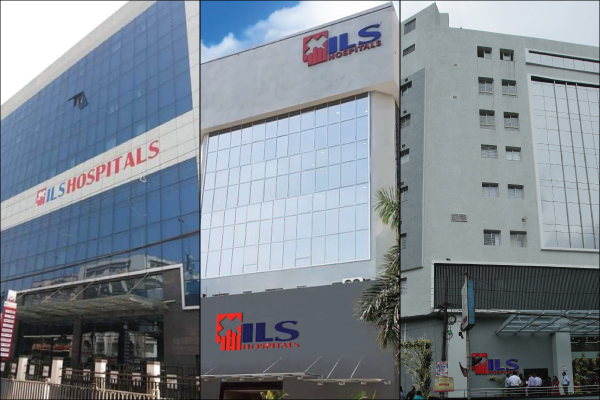
Hernia Treatment
Hernia can be difficult to deal with if not taken care. We provide hernia treatment at our several hospital units – Dum Dum, Salt Lake, Howrah, and Agartala.
Minimally-Invasive/Laparoscopic Surgery
Our healthcare institute stands for laparoscopic surgery. Minimally-invasive surgical procedures have various advantages over traditional general surgeries. A laparoscopic surgery allows you to have minimal surgical incisions, low blood loss, less chance of infections, and an early discharge and recovery.
Weight Loss Surgery
Obesity is a serious problem in our country. So, if the patient fails to lose weight through diet and exercise, there’s an option for weight loss through surgery or bariatric surgery .Our Salt Lake unit is the pioneer of the same.
Joint Replacement
Our hospitals in Kolkata and Agartala provide knee joint replacement to the patients suffering from arthritis and other joint problems.
Diabetes Treatment
Diabetes is a chronic disease and unfortunately, many Indians suffer from diabetes mellitus. If uncontrolled and ignored it becomes fatal. Hence, ILS Hospitals has facilitated diabetes treatment to everyone living in Kolkata and Agartala.
Liver Treatment
Bad Liver conditions have become quite common due to our unhealthy modern lifestyle. If you are suffering from any liver conditions, get proper liver treatment from our renowned liver specialists.
Medical Emergency Services
Medical emergency can happen at any moment. ILS Hospitals is always there to help you during such crisis. Our 24X7 emergency services ensure that you receive prompt and accurate emergency treatment.
Visit ILS Hospitals, one of the best hospitals in Kolkata in Agartala for accurate and effective medical treatment.
ILS Hospitals Dumdum: A Hospital To Support You During The Pandemic In Every Way
We have to face this harsh truth that COVID 19 is here to stay for a long time and we have to accept it and also we need to learn to live with it while following all personal safety measures all the time.
ILS Hospitals Dumdum is continuing to treat Non-COVID patients even in the midst of such a devastating pandemic with great success. We are extremely thankful to our team of doctors and the nurses who are working round the clock and are managing critical patients suffering from chest pain, kidney diseases, gall stone diseases, cerebrovascular accidents, Traumas, Caesarean sections and other conditions requiring general surgical operations.
ILS Hospitals Dumdum is committed towards the utmost safety of all our patients. COVID / Non-COVID patients are receiving the best possible care in our institution. We have taken all safety measures as per government protocol, in giving the best of services at all levels- be it OPD, Inpatient Wards, or Operation theatre. Dedicated wards and Nursing staffs have been assigned for Non-COVID patients and all critical surgery and invasive cardiology procedures are being conducted smoothly as per Government protocol. Patient safety and unconditional care of patients is our motto.
The only Mantra for this continuing success is “Ensuring patient’s 100% safety” at all stages of our patient’s journey during the stay at our hospital. In any medical emergency contact ILS Hospitals Dumdum on 033-40315000. We pledge to strive the best health care to each and every patient.
Let’s Learn Ways To Effectively Prevent Breast Cancer
Breast Cancer is a kind of cancer that develops in the breast cells. It can happen due to various factors, like gender (females are at a higher risk of developing breast cancer), obesity, ageing, exposure to radiation, previous breast conditions, alcohol consumption and genetics.
Dear ladies, ILS Hospitals, the best hospital in Kolkata would like to bring forward preventive measures for breast cancer. But before we tell you the preventive tips for breast cancer, let’s know the symptoms of the same.
-
Swelling in the breast or breasts
-
Rashes and redness in the breast/s
-
Changes in breast anatomy
-
Changes in the nipples’ appearance
-
Pain in the breasts
-
Feeling of lumps or nodes in the breasts
-
Discharge from nipples.
Now, it’s time to know how to prevent and lower your chances of developing breast cancer.
1. Maintain a healthy BMI:
Being overweight or obese (especially after menopause) puts you at more risk of developing breast cancer. Excessive fat issues increase the estrogen levels which in turn makes you vulnerable to breast cancer. To prevent breast cancer, keep a healthy body weight or BMI (18.5-24.9).
2. Control your alcohol consumption:
As we all know, alcohol consumption is injurious to health. Did you know, alcohol is also a culprit behind breast cancer? Alcohol not only raises your estrogen levels but also damages the DNA in cells causing cancer. Avoid consumption of alcohol or at least minimize it.
3. Do physical activities:
If you live an inactive lifestyle, you invite several health issues. It has been found that women who did physical activities regularly had a lower risk of breast cancer. So, ditch the sedentary lifestyle and engage yourself in physical activities.
4. Stop smoking:
Despite numerous warnings on the cigarette packets, people still smoke. Apart from lung cancer and other serious health conditions, smoking is also responsible for causing breast cancer. Ladies, if you have this harmful habit, get rid of it today to protect yourself from breast cancer.
5. Self-examine your breasts:
Regular breast self-exam (once a month) should be encouraged as it helps early diagnosis of any abnormality. To perform a breast self-exam, stand in front of the mirror and observe your breasts. Check for redness, swelling, change in size and nipple discharge. It is always best to learn this self-diagnostic method from an expert gynaecologist.
You should also consult an experienced gynaecologist, whenever you’ve any queries regarding your gynaecological health. Visit ILS Hospitals in Kolkata and Agartala for any medical help.
Do You Know These 4 Common Respiratory Diseases? Know Now
Pulmonology is a branch of medical science that deals with issues associated with the respiratory tract.
We live in a polluted world, so getting diseases that affect the respiratory system is an unsurprising reality. ILS Hospitals would like to introduce some common respiratory diseases so that people can recognize the symptoms and seek medical advice on time. 4 common respiratory diseases are disclosed below:
1. Asthma:
Asthma is a chronic respiratory disease where the bronchial tubes become inflamed and produce more than natural mucus. It is a disease that can only be controlled by following the doctor’s advice. Asthma attacks can be deadly so it is advisable for patients with asthma to always keep the inhaler sprays with them wherever they go. The symptoms related to asthma are as follows:
-
Shortness of breath
-
Wheezing
-
Chest discomfort
-
Coughing.
2. Pulmonary Tuberculosis:
Pulmonary tuberculosis is a communicable lung infection and an airborne disease caused by the bacteria, Mycobacterium tuberculosis.
To know the symptoms of this infectious disease, please read the below points:
-
Cough that lasts for more than two weeks
-
Difficult breathing
-
Involuntary weight loss
-
Chest pain
-
Anorexia or loss of appetite
-
Fever and chills
-
Night sweats
-
Haemoptysis (blood in the sputum).
3. Chronic Bronchitis:
Another common COPD (Chronic Obstructive Pulmonary Disease) is Chronic Bronchitis. This disease and its symptoms are similar to asthma, but bronchitis is caused by certain viruses and pollutants. Here are some symptoms of chronic bronchitis.
-
Shortness of breath
-
Discomfort in chest
-
Chronic cough
-
Wheezing
-
Sore throat
-
Blood-streaked or greenish mucus
-
Blocked sinus
-
Headaches.
4. Pneumonia:
Pneumonia is a common lung infection that occurs due to either of the organisms- bacteria, fungi or viruses. It makes the air sacs of the lungs fluid-filled. Let’s find out the symptoms of pneumonia.
-
Fever
-
Shivering chills
-
Nausea and vomiting
-
Sweating
-
Rapid heartbeat
-
Diarrhoea
-
Breathing problems
-
Chest pain
-
Body aches
-
Green phlegm
-
Dementia.
For any health-related queries, come to ILS Hospitals, a multi-speciality hospital in Kolkata and Agartala famous for providing advance medical supervision at reasonable rates. Our hospital team is always available for catering the needs of our patients. Visit our website for more information.
Why Are Indians So Vulnerable To Heart Diseases?
We only have one heart and it’s our sole responsibility to take the best care of our heart to make it healthy and keep it in good physical condition. Sadly, there’s an incessant upsurge in heart-related conditions among Indians.
The question that comes to our mind after knowing this fact is why Indians are more susceptible to heart diseases and cardiac emergencies than any other ethnicity? Today, we will talk about 6 reasons why more people are suffering from heart-diseases at an increasing rate in the Indian sub-continent.
1. Chronic stress and hypertension:
Our modern lifestyle is comfortable but stressful. People are constantly stressed about their career, daily commute, personal life and financial conditions. Constant stress is the supreme cause of hypertension or high blood pressure. Healthy blood pressure for an average human is 120/80 mmHg. To manage stress, you should do the following things
– Maintain healthy relationships
– Participate in physical activities
– Eat clean and healthy food
– Get adequate sleep every night
– Practice relaxation techniques.
2. Unhealthy lifestyle choices:
We all know that an unhealthy lifestyle does not benefit our body but still we indulge in them then and now. An unhealthy lifestyle is a lifestyle in which you have harmful habits like smoking, consuming alcohol, eating junk and fast food, and being physically indolent. Take an oath that you would not choose or try to avoid this afore-mentioned lifestyle for yourself.
3. Diabetes:
Diabetes has become a common disease in India and that leads to many cardiovascular diseases. Getting diabetes treatment is paramount as uncontrolled diabetes cause impaired blood vessels of the heart and other vital organs.
4. Obesity:
Indians are getting obese day by day due to various reasons. Many people are suffering from class 3 obesity which can be treated with a bariatric or weight loss surgery.
5. Congenital heart defects:
Many children in India are born with heart abnormalities that lead to serious cardiovascular conditions if not timely diagnosed. It is one of the main factors of increasing heart diseases in our country.
6. Genetic makeup:
Many heart diseases are hereditary and nobody can undo it. Your genetic makeup determines the risk of you or your children inheriting heart-related conditions.
Regrettably, we Indians match the criteria of all the above-mentioned points, and that leads us to be more vulnerable to cardiovascular diseases. If you’ve any heart-related conditions you can easily come to ILS Hospitals, one of the best heart hospitals in Kolkata for your diagnosis and treatment. We will provide you with proper medical advice appropriate for your condition.
Acquaint Yourself With These 4 Different Types Of Hernia
A hernia is an abnormal bulge in the affected area that occurs when the organ or fatty tissues comes out through a weak muscle opening. Hernias are painful and if left unaddressed or untreated can become serious and dangerous (a hernia can strangulate and even burst that leads to grave consequences).
Hernia repair surgery is the ultimate and preferable hernia treatment by the doctors. Most people are not familiar with the different types of hernia. So, we thought to acquaint you with 4 different hernia types for your awareness.
Here are different and common types of hernia
1. Inguinal Hernia
In case of inguinal hernia, a part of the intestine exists through a weak opening in the abdominal muscles. Some symptoms of inguinal hernia are as follows:
-
Pain in the groin area while coughing and lifting anything
-
A visible bulge in the groin area
-
Swollen and painful scrotum or testicles in men.
2. Incisional Hernia
Incisional Hernia occurs due to an unhealed surgical wound of abdominal surgery. The symptoms of an incisional hernia include:
-
Redness and swelling in the bulge
-
Constipation
-
Nausea and vomiting.
3. Umbilical Hernia
This type of hernia is commonly found in new-born babies but that does not mean adults do not encounter umbilical hernia at all. An umbilical hernia is formed in the belly button due to protrusion of an organ or fatty tissues. A few symptoms related to this hernia are as shown below:
-
Painful and discoloured bulge
-
Fever
-
Vomiting
-
Pain in the abdomen.
4. Hiatal Hernia
If the upper part of your stomach exits from its assigned spot and enters into the chest cavity, then it’s known as a hiatal hernia. A hiatal hernia happens due to various reasons like injury or certain surgeries, obesity, old age and abnormal hiatus. The symptoms of hiatal hernia are the following:
- Difficulty swallowing food
- Acid reflux
- Regurgitation or vomiting
- Chest pain
- Abdominal pain
- Constant belching or burping
- Vomiting blood
- Black stools.
There are many more types of hernia but these 4 types are quite common. A hernia cannot be left on its own and should be taken seriously. We offer general and laparoscopic hernia treatment to our patients with this condition. We are one of the best hospitals in Kolkata due to our perfect infrastructure, expert medical team and the latest facilities.
8 Tips To Stay Healthy During The Festival Season
It is the festive season, the month we all wait for every year. This is the time when we get to enjoy the most with our family and friends. But if during this time anyone gets sick, then all plans are bound to go down the drain. So, ILS Hospitals in Kolkata is going to give you tips on how to stay healthy and disease-free during this time.
-
Over the last few years, the rain has been an ever-present factor in the festival season especially before diwali, which also makes it easy for diseases like malaria and dengue to fester. So use mosquito repellent when going out and a net when going to sleep.
-
Viral infections like cough, cold, and fever are also very common during this season. Don’t drink cold water or cold drinks after coming from outside. Try to avoid them as much as possible, even at home. This will prevent you from getting infected with a cold infection. Especially at late night, the temperature falls and the chances of getting a cold increase. So try to avoid cold drinks, ice-creams etc. at night.
-
While going out during the day, make sure to carry an umbrella, sunglass and sunscreen with you at all times, or you may get sun-burned badly.
-
When burning crackers during Diwali, take extra precautions against any accidental burning. Be careful about smoke and loud noises specially for the children and aged individuals.
-
Eating out during the festive season is very common and half the enjoyment is in that only. So as we cannot completely avoid eating out but rather can eat wisely. Most roadside stalls are not much healthy, so choose wisely from where you are eating. If possible, carry water from home before going out.
-
It’s also a holiday time and we like to go out more as well. Going out every day during the festive season can make one tiresome, drenched out of energy and make feel thirsty. If possible carry lemonade or ORS with you. This would help to restore the electrolyte imbalance of the body.
-
If you are going out at night then make sure that you get enough sleep during the day as good sleep is important for the body. Also, staying awake at night is not good for small children and the aged individuals. So, make sure that they get their proper sleep.
-
Try to avoid the crowd if you are an asthma patient or this may aggravate your problems and may sustain attacks of asthma. Diabetes patients should continue their diabetes treatment as usual during this time and limit eating sweets as well, especially when it can be tempting once you get so many sweet boxes from your neighbors on Diwali.
Follow these tips to stay healthy and have a great Diwali and a festive season ahead.











